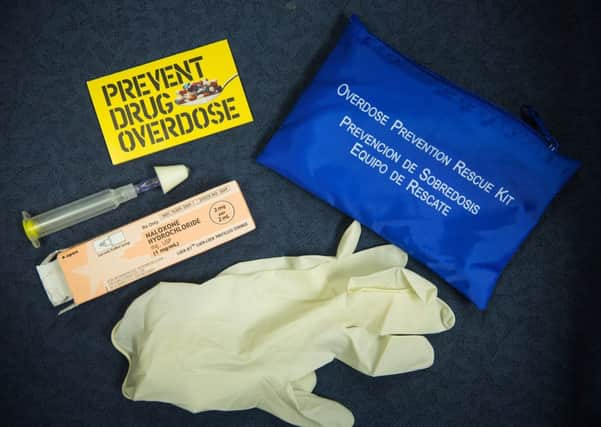Drug overdose deaths among ex-prisoners fall


Officials have compiled an updated report on Scotland’s naloxone programme, a national scheme aimed at reducing fatal overdoses.
It found that 5.5% of all opioid-related deaths registered in Scotland in 2012 occurred within four weeks of prison release.
Advertisement
Hide AdAdvertisement
Hide AdThis was down from the 8.4% recorded the year before and a baseline figure of almost 10% for the period from 2006-2010.
The drop was described as “encouraging” by officials but they stressed that the fall could not necessarily be linked to the naloxone programme because other factors may also be at work.
Scotland was the first country in the world to announce it was setting up such a scheme in November 2010, with thousands of naloxone kits distributed since then.
The drug can save comatose heroin addicts with a single injection, with the special kits given to the family, friends or carers of addicts, as long as consent is given by the person who is deemed to be at risk.
The latest official figures, published by ISD Scotland, show that the number of drug overdose prevention kits issued in 2012/13 rose by more than 10%.
The programme gave out 3,833 take-home naloxone kits that year, compared with 3,458 kits in 2011-12.
A total of 1,461 take-home kits were issued by prisons in Scotland in 2011/12 and 2012/13.
They are given to people at risk of opioid overdose and are supplied to people when they are freed from jail.
Advertisement
Hide AdAdvertisement
Hide AdLooking at deaths among newly-released prisoners, the report concluded: “There was no significant decrease in opioid-related deaths within four weeks of prison release in 2011 (8.4%) compared to the 2006-10 baseline indicator (9.8%).
“However, in 2012, 5.5% of opioid-related deaths occurred within four weeks of prison release; a significant decrease compared to the baseline indicator.
“While encouraging, this decrease cannot necessarily be causally linked to the national naloxone programme and may partly reflect patterns of declining opioid use in Scotland, particularly among younger people.”
Overall, the rate of drug related-deaths in Scotland is higher than the UK average.
In 2011 the figure stood at 10.58 deaths per 100,000 people, compared with 2.83 in the UK, the report notes.
A separate evaluation of the programme commissioned and published by the Scottish Government commended the progress made by the scheme but pointed to a need for “further reach” of naloxone kits to those at risk of overdosing.
Since 2010, more than £1 million of Scottish Government funding has been allocated to the naloxone programme.
Community safety minister Roseanna Cunningham welcomed the research.
Advertisement
Hide AdAdvertisement
Hide AdShe said: “The programme is an important intervention which, delivered alongside resuscitation training, is helping to save lives.
“Indeed, in the first two years since the programme was launched in 2011, it is estimated that it has contributed in part to 350 potential lives saved.
“While it is not the solution in itself to drug-related deaths, it is an important intervention, within a range of available treatment and support, which can help reduce drug-related harm and support people towards recovery.”
She added: “I also welcome the further information published by ISD today which shows that in 2012 there was a significant decrease in the percentage of opioid-related deaths occurring within four weeks of prison release. This is an encouraging improvement.
“We will continue to monitor the potential impact of the national naloxone programme on reducing opioid-related deaths following release from prison.”